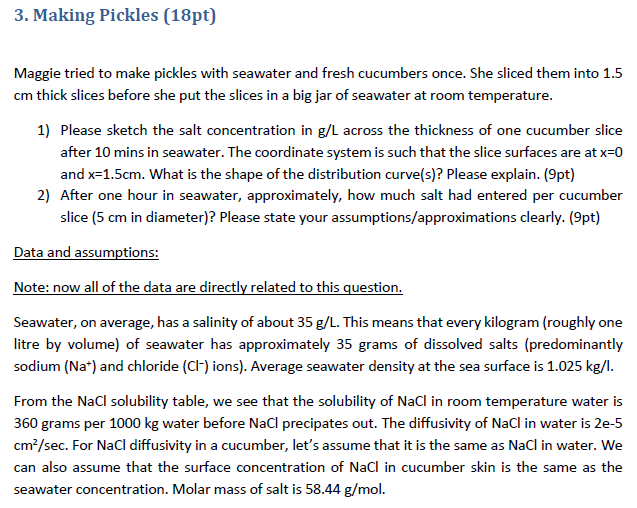Answered step by step
Verified Expert Solution
Question
1 Approved Answer
3. Making Pickles (18pt) Maggie tried to make pickles with seawater and fresh cucumbers once. She sliced them into 1.5 cm thick slices before

3. Making Pickles (18pt) Maggie tried to make pickles with seawater and fresh cucumbers once. She sliced them into 1.5 cm thick slices before she put the slices in a big jar of seawater at room temperature. 1) Please sketch the salt concentration in g/L across the thickness of one cucumber slice after 10 mins in seawater. The coordinate system is such that the slice surfaces are at x=0 and x=1.5cm. What is the shape of the distribution curve(s)? Please explain. (9pt) 2) After one hour in seawater, approximately, how much salt had entered per cucumber slice (5 cm in diameter)? Please state your assumptions/approximations clearly. (9pt) Data and assumptions: Note: now all of the data are directly related to this question. Seawater, on average, has a salinity of about 35 g/L. This means that every kilogram (roughly one litre by volume) of seawater has approximately 35 grams of dissolved salts (predominantly sodium (Na+) and chloride (CI-) ions). Average seawater density at the sea surface is 1.025 kg/l. From the NaCl solubility table, we see that the solubility of NaCl in room temperature water is 360 grams per 1000 kg water before NaCl precipates out. The diffusivity of NaCl in water is 2e-5 cm/sec. For NaCl diffusivity in a cucumber, let's assume that it is the same as NaCl in water. We can also assume that the surface concentration of NaCl in cucumber skin is the same as the seawater concentration. Molar mass of salt is 58.44 g/mol.
Step by Step Solution
There are 3 Steps involved in it
Step: 1

Get Instant Access to Expert-Tailored Solutions
See step-by-step solutions with expert insights and AI powered tools for academic success
Step: 2

Step: 3

Ace Your Homework with AI
Get the answers you need in no time with our AI-driven, step-by-step assistance
Get Started


